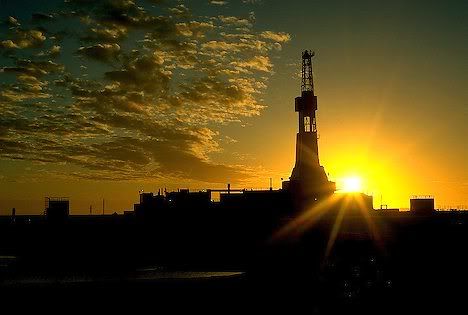Setting Up A Winning GOP Campaign Strategy
 In his Saturday address, President Bush handed McCain the campaign theme most likely to keep the White House in Republican hands:
In his Saturday address, President Bush handed McCain the campaign theme most likely to keep the White House in Republican hands:The fundamental problem behind high gas prices is that the supply of oil has not kept up with the rising demand across the world. One obvious solution is for America to increase our domestic oil production. So my Administration has repeatedly called on Congress to open access to new oil exploration here in the United States. Unfortunately, Democrats on Capitol Hill have rejected virtually every proposal. Now Americans are paying the price at the pump for this obstruction.Delivering the Dem response to the prez's radio address was Nick Rahall, chair of the Natural Resources Committee, which is the Senatorial power broker in this debate. His response:
This week, President Bush and his Republicans allies rallied behind the oil industry's political agenda once again and advocated opening more of America's federal land, including coastal areas, to drilling. This proposal will not bring the type of relief Americans deserve at the pump.So we're told that supply and demand for some mysterious reason won't work with petroleum. Yet we're told that this same supply and demand does work with the cornerstone of the Dems' horse in the energy race, alternative fuels: We'll increase supply of alternative fuels and the price of energy will drop.
Everything the enviros have said since gas prices started spiking -- heck, everything they've ever said about energy pricing -- ignores supply and demand in favor of government controls through incentives, punishments,cap and trade programs and government take-over. It's not surprising since its basic socialism.
Also inherent in Rahall's response is a problem over the definition of federal lands. He criticizes Bush for calling for "opening more" federal land (and seas) for resource development. The name of Rahall's committee is "Resources," a word the Dems and their green special interest supporters have come to define as "something that should not be touched," but traditionally means "a source of supply, support or wealth."
What exactly is this "America's federal land" Rehall's talking about? The Bureau of Land Management has under its jurisdiction 258 million surface acres and 700 million acres of subsurface mineral estates. The surface holdings represent about 13 percent of all the US, and BLM states its purpose as management first and conservation second. The land it manages represents just 40 percent of all land owned by the Federal government.
And it's profitable stuff:
The public lands provide significant economic benefits to the Nation and to states and counties where these lands are located. Revenues generated from public lands make BLM one of the top revenue-generating agencies in the Federal government. In 2007, for instance, BLM’s onshore mineral leasing activities will generate an estimated $4.5 billion in receipts from royalties, bonuses, and rentals that are collected by the Minerals Management Service. Approximately half of these revenues will be returned to the States where the mineral leasing occurred.These are the lands Bush -- and most of the rest of us -- are interested in opening up, which is the right thing to do, since it's the federal land purposed for productivity. The other federally owned land includes military bases, prisons, nuke storage sites, Washington DC -- and land owned and managed by the Department of Interior's wildlife guys for the Dem definition of "natural resources" -- critters and plants that just could not survive without our loving protection.
 But to Rahall and the special interests he serves (Earth First!, the Center for Biological Depravity ... oops, Diversity, etc.), all federal land should be treated as this subset of DOI-managed land: preserved for critters and none of it leased for resources. It doesn't matter if the impact of production on land is large (as in oil shale) or small (as in drilling); no level of impact to Gaea is allowable.
But to Rahall and the special interests he serves (Earth First!, the Center for Biological Depravity ... oops, Diversity, etc.), all federal land should be treated as this subset of DOI-managed land: preserved for critters and none of it leased for resources. It doesn't matter if the impact of production on land is large (as in oil shale) or small (as in drilling); no level of impact to Gaea is allowable.You can't blame Rahall and the Greenies for the current energy situation; you can only blame them for part of it. How much is a matter of debate; they would say the impact of their anti-petroleum, anti-nuclear position is minimal, and that it would be less then minimal if only we would get our hearts behind alternative energy.
But our hearts have been behind alternative energy since the gas shortages of the 1970s. Billions of dollars are going into alternative energy and we have little to show for it beyond higher food prices thanks to ethanol production.
McCain, like all savvy politicians is a proponent of alternative energy -- after all he can read polls that say 98% (!) of usbelieve a goal of 25% alternative energy sources by 2025 is a good one. (Of course, the poll question didn't attach a cost to that effort or say reaching the goal might cause some discomfort and displacement.) But he can also read the frustration of voters who are paying over $4 per gallon of gas, and seeing the price raise every week, so he changed his position on drilling. Albeit, not far enough, since he's still stuck in a no position on ANWR, but unlike the Dems, he changed.
And the left pounced, with the Dem party strutting and crowing about McCain's Offshore Drilling Flip-Flop: "McCain caves, once again, to the special interest." We've been through the special interest allegation already, but in this particular case, the special interest isn't the dreaded "Texas oil," which was guilty of the great sin of helping make America the most powerful, wealthiest, comfortable nation on earth, it's the people at the pump.
 With "flip-flop," the Dems are trying to paint McCain with a Kerry brush, but they fail. McCain is looking at an economic policy, seeing a changed global condition brought about by soaring demand and stifled production and refining capacity (see this lengthy PowerPoint for a good explanation of all that), and a futures market that's betting that price increases will continue, and he simply deduced that changed circumstances support changed policy.
With "flip-flop," the Dems are trying to paint McCain with a Kerry brush, but they fail. McCain is looking at an economic policy, seeing a changed global condition brought about by soaring demand and stifled production and refining capacity (see this lengthy PowerPoint for a good explanation of all that), and a futures market that's betting that price increases will continue, and he simply deduced that changed circumstances support changed policy.Kerry, on the other hand, was looking at an Iraq where nothing was changing -- it was early in the war, instable and violent, and potentially could get worse or could get better. What was changing was not the situation, but the power and funding capacity of the anti-war faction of the Dem party. McCain saw a changed world and changed his policy. Kerry saw a changed Dem power elite and changed his.
It boils down to this: $4 gas gives the GOP a glimmer of hope in November because we have the right policy and, finally, a candidate who has signaled that he's with us on that policy. The Dems have a candidate who appears not to care about the plight of the people; he'll put the supposed plight of the polar bear first.
Congress, thanks to Bush's challenge to open up more land for drilling, needs to deal with this. My guess: The Dems will go on August recess without acting. McCain better be putting on his pouncing shoes.
Labels: 2008, Alternative Energy, Energy Policy, McCain




<< Home